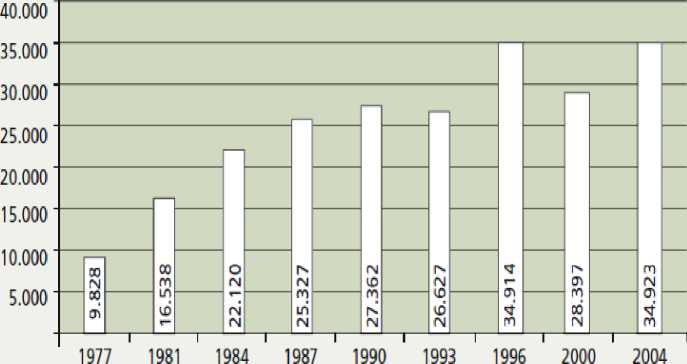23
• The security of financial planning is less reliable for the voluntary welfare asso-
ciations.63 The shortage of public resources and the market-oriented access to
social services evoke new uncertainties and set the associations under pressure
of adjustment.64 Public promotion funds are cut or have to be opened without be-
ing extended financially to private, for-profit organizations, e.g. object-related
support for nursing homes.
Integrating of self-help and voluntary work:
Self-help and voluntary work still have great and an even increased importance in Ger-
many.65 At the same time the voluntary welfare associations are loosing members like
other big organizations (churches, political parties, trade unions).
For example Workers' Welfare Service (AWO)66:
• 1.1.2004 450.000 members,
• 1.1.2005 430.000 members.
Since 1977 until 2004 the number of self-help organizations in the voluntary welfare
associations rose from 9.828 to 34.923.67
Organisationen

63 See to the changed structure of funding: Dahme/ Wohlfahrt 2000: 15-16.
64 Backer/Naegele/Bispinck/Hofemann/Neubauer 2007, Bd. 2: 545-547.
65 See the general information about voluntary welfare associations and voluntary societal commitment:
BAGFW 2002: 70-89.
66 BAGFW 2004: 66; http://www.awo.org/awo-deutschland/zahlen-und-fakten.html (last direct access:
July 9 2009).
67 BAGFW 2004:17.
More intriguing information
1. Multi-Agent System Interaction in Integrated SCM2. ESTIMATION OF EFFICIENT REGRESSION MODELS FOR APPLIED AGRICULTURAL ECONOMICS RESEARCH
3. The name is absent
4. Integration, Regional Specialization and Growth Differentials in EU Acceding Countries: Evidence from Hungary
5. Name Strategy: Its Existence and Implications
6. L'organisation en réseau comme forme « indéterminée »
7. Howard Gardner : the myth of Multiple Intelligences
8. A Rare Presentation of Crohn's Disease
9. Database Search Strategies for Proteomic Data Sets Generated by Electron Capture Dissociation Mass Spectrometry
10. The name is absent